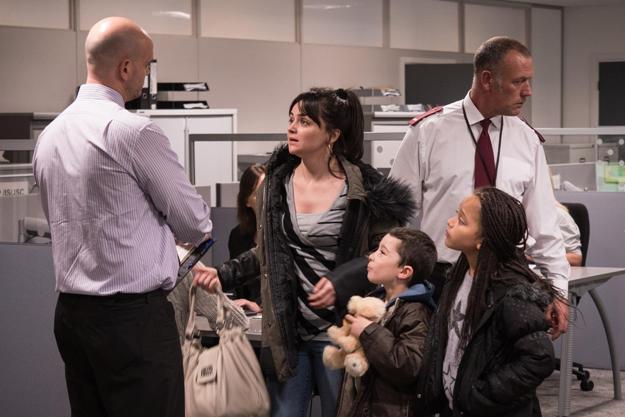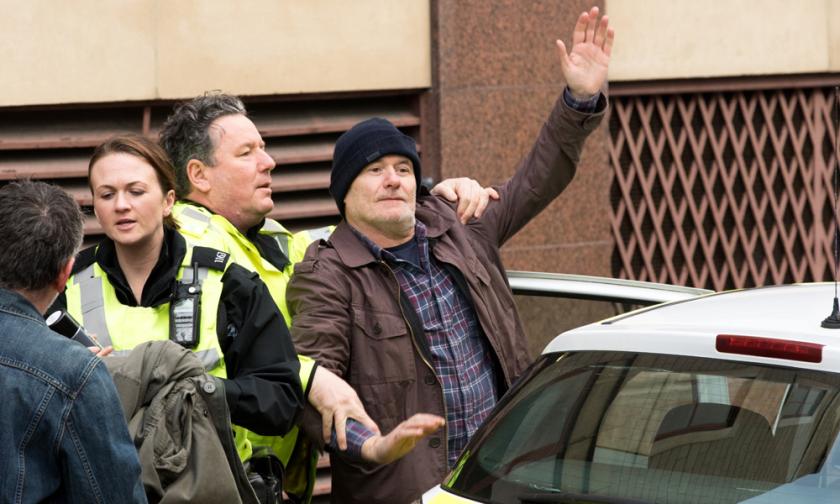Most of the crime Ken Loach investigates with compassion and humour happens off-screen right at the start. As the opening credits roll, a woman’s voice with sing-song affability perhaps appropriate to a child, if not for its bureaucratic, box-tick chill, asks Daniel Blake (Dave Johns) a sequence of questions wholly irrelevant to his problem. He can lift his arms, he can walk on his legs. So never mind the heart attack which almost made him tumble off a ladder at his work as a carpenter. The outsourced US firm employed by the Department of Work and Pensions has more opaque, inflexible criteria, sending Daniel into a British underworld where Kafka and Orwell’s absurdities meet Loach’s realist verities. It sets this hero on a picaresque quest for dignity through the streets of Newcastle-on-Tyne.
“I’m like a dog with a bone,” Daniel says early on, determined not to give in as he crawls through the contradictory maze of the benefits system. “They’ll fuck with you,” a young neighbour tells him. “It’s no accident.” Anyone with experience of this sector these days knows this isn’t paranoia. The breaking down of the post-war public battlements Loach defended in The Spirit of ’45, the idea that vulnerable fellow citizens should be looked after, not despised, is at the heart of I, Daniel Blake’s anger. It describes the cold, selfish society we’ve been encouraged to become. But it also shows the kindness which remains between people who’ve been relentlessly dehumanised in the stories we usually hear, in Benefits Street and newspaper headlines.
 Daniel’s friendship with Katie (Hayley Squires) and her two young kids, (pictured above), deported from London and anyone they know to Newcastle, finds decent people helping each other to survive in a truer version of that Oxfordshire fantasy, the Big Society. Katie’s feral breakdown at a food bank is when the national shame awakened by Cathy Come Home in the Sixties should surely be rekindled. Not that Loach expects it to, believing we’re too far gone.
Daniel’s friendship with Katie (Hayley Squires) and her two young kids, (pictured above), deported from London and anyone they know to Newcastle, finds decent people helping each other to survive in a truer version of that Oxfordshire fantasy, the Big Society. Katie’s feral breakdown at a food bank is when the national shame awakened by Cathy Come Home in the Sixties should surely be rekindled. Not that Loach expects it to, believing we’re too far gone.
Geordie comedian Dave Johns is perfect for the dry, canny wit and foul-mouthed invective Loach’s usual writer Paul Laverty gives Daniel. The realistic reservoirs of humour inside his characters is Loach's edge over the director he’s these days twinned with, Mike Leigh, who more icily observes working-class misery. The few real hits to reach the public with Loach’s concerns in recent years – Brassed Off, The Full Monty, even the director’s own Looking for Eric – heavily sugared the pill with skits and sentimentality. Loach and Laverty leaven more stringently, but there are laughs and pleasure here. There is also a profoundly realised scene about Daniel’s late wife, sketched by a few lines and the actor as he looks at a photo, which is the best thing in the film.
I, Daniel Blake sometimes clumsily loads the dice or gets narratively bogged down, but never needs to exaggerate. Its hero stoically bears huge and constant pressure and humiliation, just to survive. His one moment of rebellion is the lightning bolt of hope streaking through this film, which otherwise holds up a dark mirror to Britain.
Overleaf: watch the trailer for I, Daniel Blake















Add comment